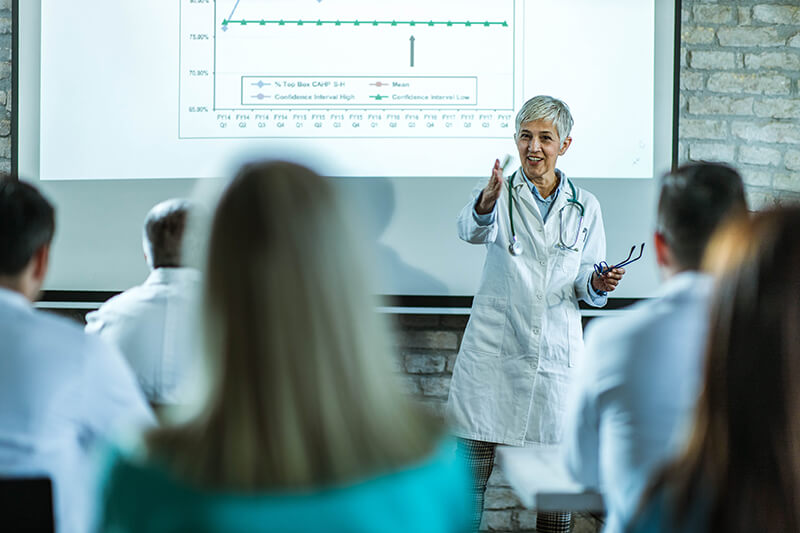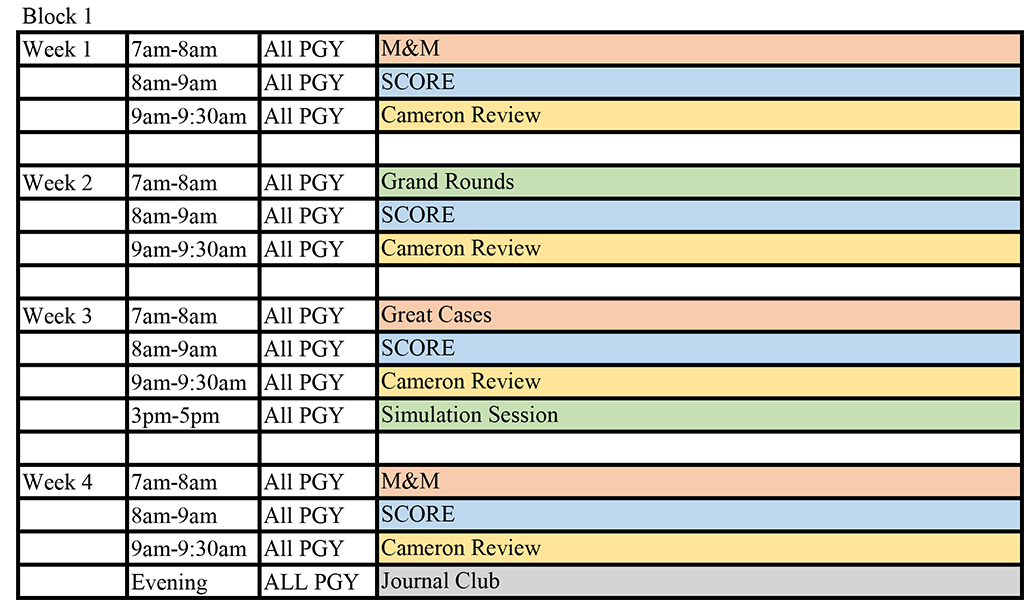Didactics
 The WKHS General Surgery residency program basic science curriculum will follow the ACS SCORE curriculum for clinical content areas (referred to as “SCORE Clinical Conference”). The curriculum will be divided along organ system and surgical specialty. The didactic conference series will focus on “disease and conditions”. Junior level residents (PGY1 & 2) will be expected to review and be ready to discuss “core” level content. Senior level residents will be expected to review and discuss both the “core” content as well as the “advanced” topics. Conference will be small group based, where the faculty moderator will be prepared to lead and focus discussion, while residents will be expected to have reviewed the topic areas prior to conference and be ready to participate in discussion. Following conference, the residents will be assigned specific questions from the SCORE question bank in order to assess content knowledge. Residents are expected to use the SCORE operative sections in their daily preparation for assigned surgical cases.
The WKHS General Surgery residency program basic science curriculum will follow the ACS SCORE curriculum for clinical content areas (referred to as “SCORE Clinical Conference”). The curriculum will be divided along organ system and surgical specialty. The didactic conference series will focus on “disease and conditions”. Junior level residents (PGY1 & 2) will be expected to review and be ready to discuss “core” level content. Senior level residents will be expected to review and discuss both the “core” content as well as the “advanced” topics. Conference will be small group based, where the faculty moderator will be prepared to lead and focus discussion, while residents will be expected to have reviewed the topic areas prior to conference and be ready to participate in discussion. Following conference, the residents will be assigned specific questions from the SCORE question bank in order to assess content knowledge. Residents are expected to use the SCORE operative sections in their daily preparation for assigned surgical cases.
Didactic Program Description
Grand Rounds: The purpose is to present clinical problems, provide updates on new and innovative developments in research and technology, and address other related issues that our current and future surgeons face. Grand Rounds are essential to medical education, teaching new information and enhancing clinical reasoning skills. (Monthly)
Mortality and Morbidity: The purpose is to conduct an in-depth review of the care of individual surgical patients who have suffered from complications or mortality. This non-punitive conference will be a collaborative effort between the resident and the patient's attending surgeon. Residents must present the pertinent aspects of the patient's care, review the literature regarding the complication (including current evidence-based practices), comment on how this case is similar/dissimilar to the literature reviewed, and include a summary of key learning points. Special emphasis will be given to the actual process of reviewing surgical complications to develop a habit of self-review, literature review, and transparency in discussing "the good, the bad, and the ugly" of the surgical discipline. The conference will also focus on quality improvement and surgical education. Residents will be asked to evaluate complications in the context of the individual patient and regarding a systems-based approach to improving the quality of care. The discussion will be centered on recognizing and preventing specific complications, how communication and cognitive errors occur in general, and how to avoid common pitfalls inherent to complex systems. Attending surgeons will be an integral part of this conference. By sharing their prior experiences and failures, the surgical residents will understand how to identify, correct, and communicate human error in the application of modern medicine. (Bi-weekly)
Cameron Review: Integrating Cameron's "Current Surgical Therapy" into the resident curriculum provides comprehensive and up-to-date knowledge on surgical procedures, techniques, and best practices. It is a foundational resource that enhances residents' clinical decision-making skills, familiarizes them with various surgical specialties, and prepares them for complex surgical scenarios (Weekly).
Journal Club: The purpose of Journal Club is to train residents in applying the principles of evidence-based medicine (EBM). Journal Clubs are designed to help residents and staff identify pertinent information addressed by the article, put them in context, discuss the scientific validity of the findings, and consider how the findings apply to practice, policy, education, or research. (Quarterly)
Simulation Training: The surgery residency simulation training program focuses on hands-on practice in robotic surgery and specialty-specific skills. Residents will engage in high-fidelity simulations to develop proficiency in robotic-assisted techniques, enhancing precision and decision-making. Specialty simulation sessions will address critical scenarios relevant to each surgical field, providing tailored training to ensure readiness for real-world challenges. The program fosters a collaborative environment, integrating advanced technology and expert guidance to elevate surgical expertise.
Didactics Block Schedule
Click the image below to see a schedule of the weekly didactics structure.





